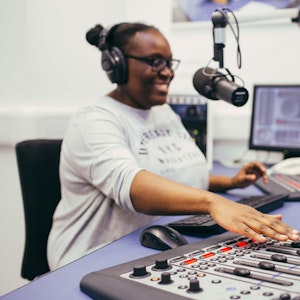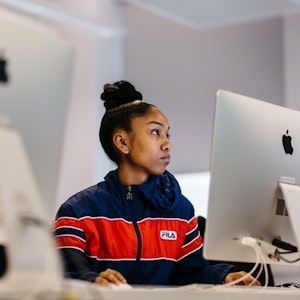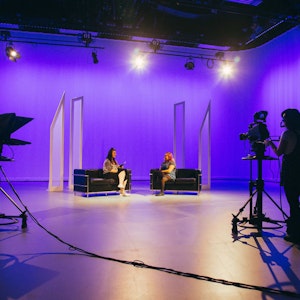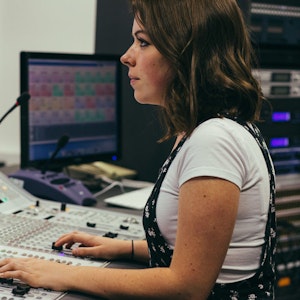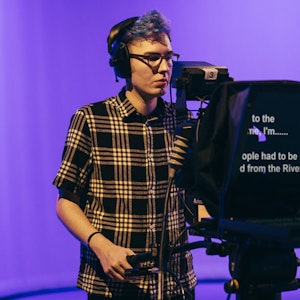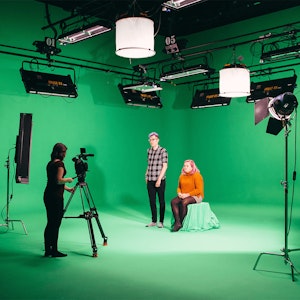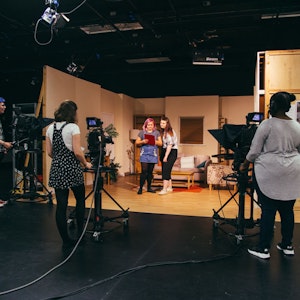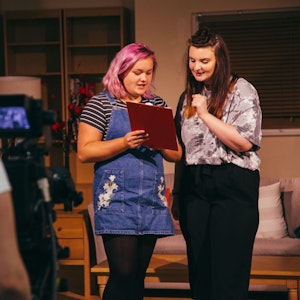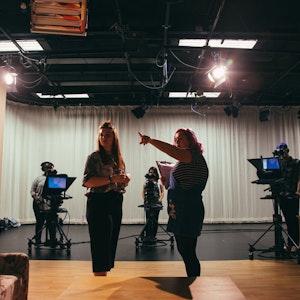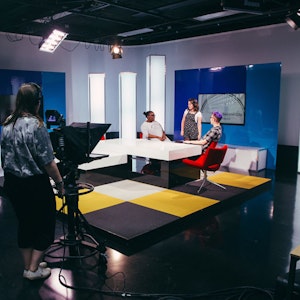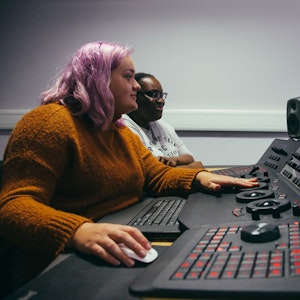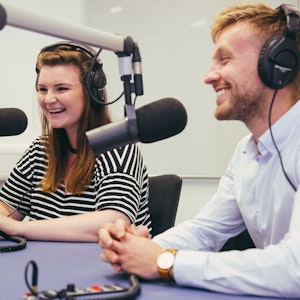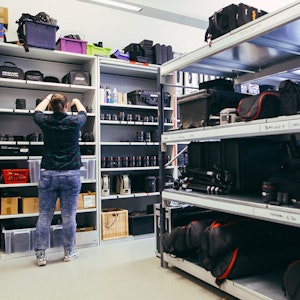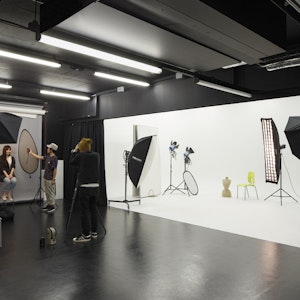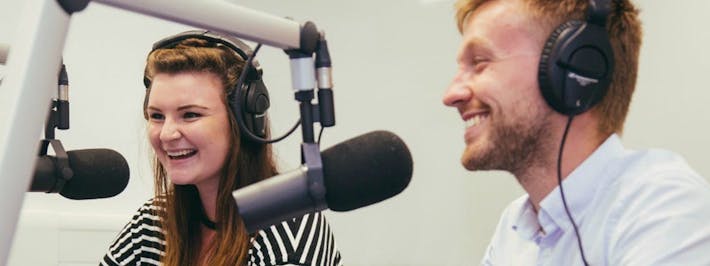
Journalism with a Foundation Year - BA (Hons)
Currently viewing course to start in 2024/25 Entry.
This course will prepare you for a career in journalism by providing you with the knowledge and cutting-edge skills required to be a professional journalist. You will become an agile, independent reporter working across multiple platforms with the ability to understand the democratic role of journalism in society, ensuring a diversity of stories are told....
- Level Foundation
- Study mode Full Time
- Location City Centre
- Award BA (Hons)
- Start date September 2024
- Fees View course fees
- School Birmingham School of Media
- Faculty Faculty of Arts, Design and Media
This course is:
Open to International Students
Overview
This course will prepare you for a career in journalism by providing you with the knowledge and cutting-edge skills required to be a professional journalist. You will become an agile, independent reporter working across multiple platforms with the ability to understand the democratic role of journalism in society, ensuring a diversity of stories are told. The course will enable you to become an adaptable journalist capable of working in innovative, engaging and entrepreneurial ways.
This course has been designed in close collaboration with leading industry experts and researchers in journalism. Through a range of complementary modules, you will learn a diverse set of journalistic skills for all news platforms and understand the wider issues that face the journalism industry. The course will prepare you for everything from live reporting to interviewing key figures, enabling you to ask the difficult questions required to cover the key contemporary issues that make up an ever-changing and increasingly diverse news agenda.
About foundation courses
This four-year programme has been specifically designed to allow students who do not initially meet the entry requirements for a three-year degree, to undertake additional level 3 study designed to ensure they are successful on their chosen degree programme.
After successful completion of your foundation year, you will have the flexibility to switch (should you wish to change direction) onto several related undergraduate Media degree programmes.
What's covered in this course?
You will learn through research-and practice-informed teaching and have the chance to undertake placement opportunities. You will develop creative storytelling skills that allow you to offer insight into important issues and shed light on a diverse range of news stories, all underpinned by traditional skills and knowledge needed to excel in journalism. As well as technical skills, you will also develop the ability to analyse, innovate and explore theoretical concepts to enable you to make your mark in the industry or progress to further study.
Through activities such as workshops and live reporting sessions, you will work on real stories giving you a clear insight of the impact they can have at a local, national and international level. On completion, you will be equipped with the ability to be adaptable to take advantage of the diverse range of opportunities on offer.
Our BA (Hons) Journalism course is delivered by industry experts from broadcast, print and digital, providing a strong foundation for a professional career. Our strong links with key journalism organisations means students will also get the chance to work on live briefs as well as producing content for our award-winning Birmingham Eastside website. Our newsroom media hub also allows for collaborative work as part of the wider Birmingham City University journalism community. Our graduates have gone on to work for Sky, BBC, Reach Plc and the Express & Star. Others have scooped prestigious awards while still studying with us.
Birmingham City University prepared me for the world of journalism by providing me with the skills and confidence to succeed in a professional newsroom environment.
Thomas Lynch, 2017 graduate, now working as a Trending Video Reporter with Trinity Mirror
Why Choose Us?
- Our unique partnership with HuffPost UK will give you the chance to receive tutorials and masterclasses from the HuffPost UK team, as well opportunities for placements and visits to their bureaus.
- Industry-standard facilities including six radio studios, four TV studios, the largest free-standing green screen in Europe, edit suites, music production studios, a newsroom media hub, and photography studios.
- You’ll receive a mobile journalism kit on arrival, allowing you to learn cutting edge skills across multiple platforms and experience the thrill of live reporting from day one.
- Teaching by active journalists who are industry-leading specialists in their field, including data journalist and author Paul Bradshaw and hyperlocal reporting award-winner Ross Hawkes.
- The course’s experimentation ethos means you’ll learn to push the creative boundaries to tell stories to a range of real audiences in a new and innovative ways.
- The chance to see your work published on the award-winning Birmingham Eastside platform.
Open Days
Join us for an on-campus Open Day where you'll be able to meet us in person. Booking for the next event isn’t open yet. Register your interest below and we’ll email you as soon as booking goes live.
Next Open Day: 29 June 2024
Entry Requirements
These entry requirements apply for entry in 2024/25.
All required qualifications/grades must have been achieved and evidenced at the earliest opportunity after accepting an offer to help confirm admission and allow for on-time enrolment. This can also include other requirements, like a fee status form and relevant documents. Applicants can track their application and outstanding information requests through their BCU mySRS account.
Essential requirements
80 UCAS tariff points
If you have a qualification that is not listed, please contact us.
Fees & How to Apply
UK students
Annual and modular tuition fees shown are applicable to the first year of study. The University reserves the right to increase fees for subsequent years of study in line with increases in inflation (capped at 5%) or to reflect changes in Government funding policies or changes agreed by Parliament. View fees for continuing students.
Award: BA (Hons)
Starting: Sep 2024
- Mode
- Duration
- Fees
- Full Time
- 4 years
- £9,250 in 2024/25
- Apply via UCAS
International students
Annual and modular tuition fees shown are applicable to the first year of study. The University reserves the right to increase fees for subsequent years of study in line with increases in inflation (capped at 5%) or to reflect changes in Government funding policies or changes agreed by Parliament. View fees for continuing students.
Award: BA (Hons)
Starting: Sep 2024
- Mode
- Duration
- Fees
- Full Time
- 4 years
- £16,085 in 2024/25
Guidance for UK students
UK students applying for most undergraduate degree courses in the UK will need to apply through UCAS.
The Universities and Colleges Admissions Service (UCAS) is a UK organisation responsible for managing applications to university and college.
Applying through UCAS
- Register with UCAS
- Login to UCAS and complete your details
- Select your course and write a personal statement
- Get a reference
- Pay your application fee and submit your application
You are not required to submit a portfolio for this course.
Course in Depth
Foundation Year
In order to complete this course you must successfully complete all the following CORE modules (totalling 120 credits):
This module will introduce you to the underlying principles required to understand media audiences. Audiences are diverse in their make-up and in their motivations for engaging with media. To explore this diversity you will learn a range of techniques for researching audience behaviour, such as survey work, focus groups and online ethnography. Alongside these methods you will explore key concepts to help you to interpret and understand this research data. You will engage with theories of identification and culture in order to understand audience motivations for engaging with media. You will explore the characteristics of audiences and learn how to identify their needs from a production perspective. To complement this investigation, you will also examine other related concepts such as genres and understand how the wider media industry uses the category of audience to create, market and ultimately sell its products. You will learn how to use your research data to present an idea for a media product that will appeal to a particular media audience.
Progressing to higher education study and charting future career aspirations presents new challenges, expectations, and ways of working. This module will equip and introduce students to the academic expectations, opportunities, and behavioural skillsets they will encounter and rely upon at university as they position themselves to be future media workers.
Students will plan and produce a media artifact that will evidence their competence in media production to create a meaningful media artifact. The focus in this module is about understanding how image and sound is edited together to create meaningful narratives. In the module students will develop an idea and implement it as a short audio or video piece. Central to creating this piece is learning how to use relevant portable video and sound production equipment and software. The ability to effectively record and edit a variety of media formats using industry standard equipment software is a key skill to develop whilst at university. This module will introduce students to the practical basics of editing.
This module is focused on collaborative work in a media production context. Through a group production activity students will learn about media production hierarchies and how to behave within a team context in order to produce a successful outcome. The module will explore what makes for successful teamwork in the media. The module will further develop the understanding of media production practice.
Identifying and understanding the connections between media theory, culture, and production is an essential skill for students to develop. Understanding how these concepts and practises interlink is key to succeeding at university and working as effective media workers. This module will introduce basic research practise methods and media theory and will enable students to gain insights into the role these concepts play in underpinning media production and culture. The module offers an opportunity for you to explore theoretical concepts in your own practice.
The media project module will present students with the opportunity to consolidate their learning whilst on the Foundation Media course. Students will be invited to devise, plan, and deliver a practical piece of work focused on their area of media interest. Students will draw from their experience and knowledge gained from their engagement with the course and creativity that evidences their ability to produce effective media artifacts.
First Year
In order to complete this course you must successfully complete all the following CORE modules (totalling 120 credits):
This Level 4 module is designed to introduce you to key concepts and approaches to understanding media texts, industries and audiences. Production, distribution and reception/consumption is at the core of the creative, media and interrelated industries. Through a combination of lectures and workshops you will learn about the relationship between texts, the industries that create and distribute them, and the audiences and consumers that interact with them. You will also consider how these relationships are linked to changes in wider creative and cultural contexts, whilst exploring what implications these relationships have on your own engagement as a consumer, producer and aspiring professional.
Building on the Semester 1 module Understanding Media Texts, Industries and Audiences, this module will introduce you to key approaches and methods to researching and analysing media texts, industries and audiences. Through a combination of lectures and workshops you will develop the knowledge and methods required to investigate an aspect of media texts, industries or audiences of your choosing. You will learn how to analyse research data through a combination of analytical approaches and draw conclusions from your evidence which you will express in an appropriate format.
This module will introduce you to a key aspect of doing journalism – that is, telling stories about people and places. Through this, the module will help you transition into studying at the University, introducing you to how you will learn, making effective use of the university’s resources, managing your own time, and collaborating with others.
In this module you will learn about the role digital platforms play in journalistic reporting. You will develop skills to allow you to work as a reporter in the online landscape by exploring how different media elements such as text, images, video and audio can work together to tell compelling stories. You will be introduced to publishing platforms and explore the ways in which online journalists can produce content using digital tools. The skills learned will form the foundation for you to develop an understanding of how journalism has evolved to embrace online platforms. You will then work to develop stories suitable for publication on outlets such as Birmingham Eastside and develop knowledge of how journalists connect with audiences in such spaces.
In this module you will be introduced to the core production skills of journalism. You will learn about news values and why stories are considered newsworthy before examining how stories are constructed and the different elements of an original news article. You will also explore ways to angle your story and identify the hook that draws in an audience. Learners will also develop an understanding of core newsgathering and productions skills such as finding leads, carrying out interviews and using quotes.
In this module you will work collaboratively with other students on a real-world project that is related to your production area and that is connected to a specific community. The module will explore a range of methods for group working, supporting you and your team to collaborate effectively to produce a media artefact (or series of artefacts) and to present the results to a general audience. You will identify a community who would benefit from your project – this benefit might be felt as audiences for your artefact, or as contributors or co-creators. Participation, with your fellow students and with an identified community, are at the heart of the module. The module will enhance your employability through ensuring you respond to the challenge of collaboration in a professional manner, respecting both your peers and those external to the University that you may be working with.
Second Year
In order to complete this course, you must successfully complete all the following CORE modules (totalling 60 credits):
In this module you will learn about the contexts in which journalism is produced by examining theoretical concepts and focusing on the current state and changing nature of journalism in the 21st century. The module involves looking at the circuits of journalism production, distribution, and reception/consumption and asking questions about how these are changing and what the significance of those changes is for society and for individuals. It explores the political, ideological, technological, and cultural contexts in which journalists work and considers the role of journalism in society and culture.
This module is designed to help you to develop an understanding of the concept of freedom of expression, and how it is balanced by the legal, regulatory and ethical constraints on news reporting and the media in general. The module is key in developing your awareness, knowledge and skills concerning media law, enabling you to protect yourself, your employers, and subjects of your work. The module approaches law and ethics from a practicing journalist’s perspective rather than that of a legal professional.
Practical reporting will explore the ways in which you will be able to take a story from concept through to publication and output. This module is unique as it offers a simulated newsroom approach, where you will work to regular deadlines. The module will introduce you to the challenges faced by journalists in newsrooms up and down the country each day. You will work to live briefs and on specific reporting tasks designed to allow you to enhance a variety of skills such as sourcing news, identifying interviewees and researching background material to support your content.
In order to complete this course, you must successfully complete at 20 credits from the following indicative list of CORE Faculty modules.
The purpose of this module is to enable you to develop professional attributes and subject skills through experience in the work place, and to critically reflect upon your learning in that context. You will normally be expected to arrange your own placement, with support from academic staff and ADM Careers+.
This module provides an opportunity for you to apply your knowledge and skills to an external, professional brief. The brief will be set by or in discussion with an external client/agency/community and could be a ‘real life’ problem to be solved, or a simulation. It is an opportunity for you to engage in a responsive, imaginative and professional manner with an aspect of your subject area, which contributes to the development of employability skills within the supportive infrastructure of the University.
The module is an opportunity to learn and critically reflect on the skills of collaboration by enabling you to create an interdisciplinary project with students from complementary disciplines, or with academic staff. Collaboration is a vital employability skill within the Creative Industries and this module allows you to develop these skills, making use of University facilities and with the support of academic staff. Within this module framework, several kinds of collaborative opportunities are available. For example, with the approval of your supervisor, you can determine a project based on your own interests; your supervisor may set you a predetermined project to enable you to work with other students in a way that is appropriate to your subject area; or there may be opportunities for you to collaborate with staff on research projects. In all cases, you must apply your subject skills to an interdisciplinary project which will be agreed in advance with your supervisor.
In order to complete this course, you must successfully complete at least 40 credits from the following indicative list of OPTIONAL modules.
Studying the Bi-Media Drama module will enable you to develop specialist, and integrated skills in radio and television drama production. You will undertake a series of practical workshops, including developing ideas for drama, structuring dramas, directing fiction for radio and television, producing actors, foley work, audio mixing, camera movement.
You will build on your previous studies by developing skills in connecting research and practice. Through set readings, class discussions, e-learning and directed study tasks, we will identify and explore key debates, theoretical perspectives and concepts in humour and comedy studies so that you can develop your familiarity with these theoretical fields. You will then test theoretical perspectives and key concepts through your own innovative comedy production. In this work, you will offer research- based, critical reflection on your own practice and on political, moral and ethical issues that emerge from the relationships between humour, comedy and power, on both a national and an international scale.
This module offers an introduction to some of the ongoing academic debates on media fandoms and subcultures. Through readings, lectures, seminars and independent research, you will engage with key theoretical perspectives, methodological approaches and case studies in these academic fields. This module is intended to develop the knowledge and skills that you established in your first year, to develop your critical thinking and research skills and to enable you to gather, organise and use secondary and primary sources to express arguments coherently and effectively.
This module is for students wishing to further their photographic abilities, exploring the professional working practices and the visual language specific to photojournalism with due consideration to the context in which photojournalists and documentary photographers, music photographers and sports photographers operate within the media industries. You will continue to develop camera, lighting and post-processing techniques to a more advanced and appropriate professional level as a complementary skillset to your media interests.
Studying the Television Studio module will enable you to develop technical, editorial and integrated skills in television studio production. You will undertake a series of practical workshops, including developing ideas for studio-based TV show formats (e.g. magazine, chat, news, game show), the commissioning process, production team structures and roles, research and editorial skills, scriptwriting, and the technical framework and processes for studio production. You will be encouraged to experiment, developing original ideas for studio productions, and take creative risks within a recognised professional context. You will identify your target audience and broadcast platform/s for your chosen programme genre.
The ability to create compelling content is an essential communication skill and the key to employability in a range of media careers, not least in Public Relations. As well as being engaging and accessible, effective communication almost always involves the ability to produce professional content across a range of platforms and channels. This module concentrates on developing the writing and crafting skills that are highly valued by media employers.
Digital Storytelling techniques have evolved to include everything from film techniques, still images, immersive-audio, environmental storytelling, and more. In this module we will consider the different ways in which these techniques can be effectively utilised to allow creative citizens to share their stories and to create engaging and meaningful stories through digital platforms.
This module will encourage you to develop original ideas for innovative radio documentaries and podcasts, within a recognised professional industry context. You will identify a clear target audience for your work. You will produce an individual, self-contained radio documentary or a pilot episode of an original podcast with an accompanying reflective written report. A live presentation will showcase your documentary / podcast concept and its audience / station in a mock ‘commissioning’ style pitch.
This module is for students wishing to further their photographic abilities, you will continue to develop camera, lighting and post-processing techniques to a more advanced and appropriate level whilst working towards distinct areas of photographic practice within defined professional contexts. The module encourages you to explore and evaluate a range of styles, approaches and working practices of commercial photographers enabling you to engage in creative photographic production utilizing appropriate techniques relevant to contemporary professional photography practice.
It’s easy to be dismissive of emotion, and often phrases such as “you’re being over-emotional” are used pejoratively. However, cultural theorists and sociologists are increasingly discovering that emotion underpins what it means to be human and that even decisions and positions we take that we assume to be based on rational thought are informed by emotion. These emotions can be constructed by the people, law-making and media texts that we encounter. This module invites you to explore the links between emotion, media and culture. You will examine how media texts are constructed to provoke emotional responses, how audiences respond and the cultural discourses which frame production and reception.
This module introduces students to key issues and debates around the media and environmental sustainability. Students will engage in critical analysis of media representations of climate change, environmental activism and the environment more generally (as well as the larger questions these raise about what sort of future economy and society we want). The module explores ideas and theoretical concepts drawn from Media and Cultural Studies and the Humanities more generally for thinking about our relationship to the planet, how the effects of the climate emergency are experienced unequally across race, class, gender, sexuality, and in the global North/global South This includes (but is not limited to) the Anthropocene, ecofeminism, queer ecologies, post-humanism, and perspectives on legacies of colonialism and environmentalism racism.
This module will explore the historical, cultural, social, and political context of both television and emerging screen practices. The approach to screen media in this module will enhance students’ knowledge of production, consumption, and industry context, and will build on the critical and analytical skills learnt in year one.
Graphic design is an important element in media communication that is used across all mediums in a variety of formats, from print to screen. How designers and communicators use imagery and form to transmit messages evolves as new technology and practices emerge. Whether this is in advertisements, promotional material, entertainment, or raising awareness of societal and environmental issues, design can draw attention and change the perceptions of the intended audience and casual viewers alike.
PR Campaign Planning explores the many and varied creative solutions the PR industry employs to attract the attention of the public and the media to a particular cause, subject or activity. The module considers how PR campaigns can be developed to serve different purposes, including brand building, commercial gain and social change. It draws on a range of examples from across sectors and around the world to inform your understanding and inspire your own creative communications solutions.
In this module you’ll explore alternative news media formats and examine the way they are challenging the traditional platforms of journalism. You will get the chance to engage with tools which are increasingly being used in everyday journalism practice, such as Tiktok, Whatsapp, Twitter and email newsletters. This will help you understand how traditional journalism is being influenced and reshaped by digital platforms, whilst preparing you for the workplace, where adaptability to new technologies and platforms is increasingly expected. You will engage in independent secondary research of industry, instructional, case study and scholarly materials, to inform your experimental and exploratory approach to creating your own portfolio of work.
Public Relations is all around us. Brands, businesses, celebrities, charities, politicians, and everyone in between use PR as a means to spread messages, inform understanding and influence the way we behave. In practice, PR involves a range of different communications techniques and activities, including media relations, social media, and influencer engagement.
As revenue streams for recorded music are put under increasing pressure, live music remains one of the important financial strands of a professional musician's career. This Level 5 module introduces you to the various elements and roles of the live music sector. The organisation, planning and delivery of live music events speaks to its interconnectedness across the wider music business and creative industries, including media production, PR and promotional strategising, communication, journalism, photography, marketing and social media management.
On this module you will develop specialist practical skills in live radio production. You will learn about the critical role of the Producer in generating ideas for programme content and in directing members of a production team. You’ll apply editorial judgement in selecting items suitable for the target audience, producing short features, programme trails and handling studio and remote guests. You will develop a critical understanding of social media marketing in radio and consider how it can be used to enhance audience engagement.
Core modules are guaranteed to run. Optional modules will vary from year to year and the published list is indicative only.
Final Year
In order to complete this course, you must successfully complete all the following CORE modules (totalling 40 credits):
Knowledge of advanced reporting techniques has become increasingly important for both journalists and publishers as the journalism industry changes in response to widespread access to information and a more competitive publishing environment. This module will equip you with the advanced techniques to find exclusive stories and to ethically and accurately report those for an identified audience within professional contexts.
In this module you will develop a plan for the delivery of your Major Project. You will build further on project management skills, techniques and processes introduced elsewhere on your course, enabling you to bring together a project plan that can be successfully realised. You will synthesise your existing knowledge of your subject specialism and formulate your own approach to addressing a specific problem, question or topic. The module will look at how to evaluate the usefulness of primary and secondary source material in relation to your project and ensure you consider ethical issues in your project plan design. The module aims to ensure that you judge the appropriateness of a variety of critical and analytical approaches to developing a major project and ensure that you create a plan that is within scope and can be delivered successfully to a high standard.
In order to complete this course, you must successfully complete one module from the following list of CORE-OPTIONAL modules (worth 40 credits)
The Major Project - Dissertation module is where you will put into practice the creative thinking, initial research, proposal, and plan developed in the Major Project Preparation module and wherein you will undertake a sustained, in-depth and theoretically informed research project exploring an area that is related to an aspect of media and culture and is of personal interest to you. Completion of the Major Project represents the culmination of your studies.
The Major Project - Hybrid module is where you will put into practice the creative thinking, initial research, proposal, and plan developed in the Major Project Preparation module and wherein you will undertake a sustained, in-depth and theoretically informed research and production project exploring an area that is related to an aspect of media and culture and is of personal interest to you. Completion of the Major Project represents the culmination of your studies.
The Major Project - Production module is where you will put into practice the creative thinking, initial research, proposal, and plan developed in the Major Project Preparation module and wherein you will undertake a sustained, in-depth production media project exploring an area that is related to an area of personal interest to you and wider audiences. Completion of the Major Project represents the culmination of your studies. You can produce a single media product or portfolio of products either individually or as part of a group.
In order to complete this course, you must successfully complete at least 40 credits from the following indicative list of OPTIONAL modules.
Media Activism is a practice-based research module for students who wish to study media activism, and engage in media activist work in practice within social justice, community media and voluntary sectors. This module will examine the role of media in political campaigns and social movements, with a focus on the role of digital communications. It will draw on a range of interdisciplinary literature from media studies, social movement studies and political theory, and examine case studies of political campaigns and social movements in the UK and globally.
This module is intended to give an overview of the current state of scholarly research into the use of social media platforms as a communication tool. The module provides a systematic understanding of the approaches to studying social media and its social and cultural role. The module looks in detail at the ways in which social media is utilised by citizens and media producers. This will give students a greater understanding of practices of interaction and communication afforded by social media and how these can shape contemporary social relationships and communication/media practices through different power dynamics. We will also consider the different ways of meaning making in social media use, particularly across different linguistic and communicative strategies including, for example, hashtags, emojis, memes, affective language, and remix culture. There is a focus on how students can put social media to use as a tool for furthering their professional ambitions or to help create advocacy networks.
This module will enable you to look towards the future innovations occurring within the fields of digital media. Starting with a history of digital emergence, considering concepts such as remediation, convergence culture, and the post-digital, we will then begin to unearth some of the more experimental and emerging practices, and consider their viability for a digital future. We will ask why some mediums prevail and others pass us by and to question what is really “new” about new media, and how we might escape certain structures and practices that constrict our developments. This module will also engage critically with ideas of utopian and dystopian predictions of the future and engage with concepts such as posthumanism and transhumanism to ask what the long-term impact of digital media usage might mean, from AI to cyborgs and beyond.
This module is for students wishing to further their creativity and provides the opportunity to develop a unique visual style as a photographer in line with appropriate professional practice. You will engage with a variety of creative photographic approaches and explore innovative practice, informing your own photographic style and enabling you to work professionally within specific fields of photography.
On this immersive module you will develop the skills and knowledge to design and format a new radio station brand. You’ll work with peers to plan, launch and run an online radio station and will pitch for and undertake a range of production and station management roles. The module will build on the practical and theoretical skills developed earlier in the course. It will offer you the opportunity to apply these in the conception, marketing, launch and operation of a publicly available radio service and in the production of other associated social media, podcasting and visual content.
The United Kingdom commissions, produces and broadcasts more audio drama – online, on digital and on radio – than any other country in the world. In this diverse and dynamic medium, writers can tell human stories set anywhere in time and space, at a fraction of the cost of television and film production. What’s more – as an old industry saying goes – ‘you see it better on radio’. In this module you will learn how to write and produce compelling audio drama scripts and episodes of a podcast drama series by engaging practically and theoretically with the key principles and techniques involved. You will also be introduced to editorial collaboration, the pitching of projects, and appropriate methods of presentation, including recorded voice essays that can incorporate sound effects. You will learn how to communicate ideas clearly, accurately and effectively both orally and in writing.
Audience and user experience design is the reference point for meeting audience and user needs for most media products. User experience is the understanding of who your audience is, what motivates them, what frustrates them, and how to add value to their lives. User experience enables the designer of experiences and media products to meet their audience’s needs on an emotional level through a creative process called "design thinking" and encourages repeated use. In an increasingly user-focused world, user experience design is an area that transcends its home of digital media design and can be applied to any field that requires an audience and consumer interaction, with many employment and further education opportunities to consider.
This module applies and develops critical and theoretical study of gender and sexuality across a wide range of media. The module will draw from cultural theory and a range of qualitative and ethnographic research to explore historic and contemporary discussions, issues and debates around gender identity, sexuality and sexual practices, and attitudes towards ‘the body’. The module will develop key modes of analysis and research related to the study of gender and sexuality, and how these are informed by and through culture. You will explore how associated socio-cultural, political and ideological contexts ‘produce’ issues, but also how certain identities and ‘practices’ offer ways to challenge ideological views concerning gender, sexuality and what we ‘do’ with/to our bodies.
This module examines key issues, concepts and debates relating to race, culture and the media, and how the diversity of lived experience is represented in the media. The module takes an intersectional perspective, considering race in relation to gender, sexuality, citizenship, etc. It engages with literature from Media and Cultural Studies, and also draws on Postcolonial Studies, Critical Race Theory and other aspects of Humanities scholarship. A range of media examples will be considered, ranging from film and television to digital media platforms. Students will have the opportunity to explore their own personal and research interests in relation to the module themes, and explore methodological approaches for doing so. Students are encouraged to consider their own positionality and identity as media workers/scholars in relation to the module themes and their own work.
This module examines both the historical and contemporary fields of popular music and their relationship to music business and the wider media, creative and cultural industries. You will have the opportunity to reflect on issues of production, distribution, and reception, through the lenses of theoretical concepts and approaches such as genre, ethnicity, gender, and many others. You will undertake research that explores the changing ideological, political, technological, and cultural contexts related to popular music and will consider the role of popular music in relation to societal and cultural contexts.
In this module you will set up an innovative media production company that explores the opportunities available for new enterprises in contemporary audio or video production. In doing so you will start to establish yourself as a professional media worker, exploring the possibilities for change and innovation. You may work independently or as a team member.
Communication in Action takes a critical look at how organisations operating across a wide variety of sectors use communications techniques to achieve operational goals. It examines the PR strategies and practices they use to enhance their credibility and reputation with a range of stakeholders through effective messaging.
In this module you will explore alternative storytelling methods to create engaging feature articles for different publications. From profiles through to in-depth interview articles, you will analyse and apply the structures and techniques used by feature writers in the professional journalism industry.
Download course specification
Download nowHow you will learn
Your learning will be through a mixture of lectures, practical workshops and seminars. Your course also provides an opportunity to undertake work-based learning through a placement. We embed flexible opportunities for you to access your curriculum including recorded lectures, blended learning, on-campus delivery and intensive delivery of some modules. We recognise that students progress to higher education from a variety of educational experiences and that university is a completely new educational environment for most of you. For that reason, you will find that in your first year with us there is a focus on supporting your transition which places an emphasis on developing both the confidence and the competencies required for being successful at your university assignments. Where appropriate, we will bring in external speakers or arrange visits relevant to your specialism. These may be from industry or be focused on a particular specialist academic interest. We have excellent links with industry, community and scholarly partners which we draw on to enhance your learning experience.
How you will be assessed
All our assessments are designed to ensure that you meet the learning outcomes of your modules and thus of the course overall. Assessment types may include written research reports, essays, case studies, practical work, portfolios and presentations. There are no formal examinations on your course, but short classroom tests may be included within an element of assessment. You will be assessed as an individual but there may be times when you will be asked to work within teams and submit assessments as groups. All modules offer chances for formative assessment, that is, informal assessments that are used to assess your understanding before the final submission of your work. Formative assessments also help inform the teaching strategy within a module, identifying areas where we can offer extra help and guidance. We will offer tutorials and a chance for you to discuss your draft assessments before you submit them. Once marked, we will give formal feedback and ‘feed forward’ on all work submitted, aimed at helping you improve future submissions
Our Classes
We pride ourselves on giving students real journalism experience through practical activities. These have included reporting live on breaking news stories, as well as, planning and implementing coverage of major sporting, cultural and political events alongside professional outlets.
You will also get the chance to see your work published on the award-winning Birmingham Eastside website which is run by students on our journalism modules.
Examples of activities
Mobile reporting
The mobile reporting kits allow students to explore journalism in real time, with some sessions delivered on location. This gives students a chance to experience as well as understand the opportunities for covering stories in alternative ways.
Collaborative working
All modules encourage students to collaborate with their peers, lecturers and external organisations. Live briefs from the journalism industry allow students to explore real-world challenges.
Virtual newsroom
The virtual newsroom lives alongside our physical space and allows students to access a wealth of support, advice and materials to ensure that learning continues beyond the class sessions.
Masterclasses and extra-curricular activities
Through collaboration with students, guest speakers and topics are identified to create additional talks and sessions.
Our Students
A partnership with other local news organisations has seen students create and run live blogs on issues such as local and general elections.
Students are using virtual reality and 360 degrees technology to tell stories in innovative ways – work which has led to coverage on a leading industry website.
Multiplatform reporting is allowing our students to create unique and powerful ways of telling real stories using a range of skills and different types of media.
Employability
Enhancing employability skills
The course will equip you with first-hand practical expertise and provide you with the rigorous academic knowledge you’ll need to fulfil a career in your chosen communications and journalism field.
Our track record for graduate employment is excellent, with the majority of graduates going into a media-related role. The course opens up specific employability avenues related to the production route chosen. A number of journalism graduates from Birmingham City University have gone into roles such as social media editor, reporter, and trending video editor.
Links to industry
Regular guest speakers and visiting lecturers from newspapers, broadcast, magazines and online publications will provide you with an insight into the modern journalism industry. By working with specialists in their field you will be able to learn how to bring stories to life.
You’ll also get the chance to engage directly with industry through activities such as hack days and projects with the likes of the BBC, The Times and Trinity Mirror. We have excellent links with a number of national, regional and local outlets, with students regularly taking up placements with the likes of Sky and the BBC.
Graduate job successes

Students from the School of Media have been making headlines after landing journalism jobs before they’ve even graduated.
Thomas Lynch (pictured in his new workplace) and Lillian Keen have become trending video reporters with Trinity Mirror, while Elis Sandford is now a news reporter with the company. They join 2016 graduate Charlotte Smith who began working with the national newspaper group earlier this year.
Thomas said: “I handed in my production project on the first Friday of May and the following Monday, I was a trending video producer. If you work hard enough and take advantage of what your university offers you, there is success to be found. Who said it was difficult to find a graduate job?"
There has also been success for another soon-to-be graduate after Thomas Chapman began working as a news reporter with the Eastern Daily Press.
Placements
The School strongly believes in the practical application of learning and is fortunate to have very strong links with employers and the media industry. Students on placements have worked with a wide range of organisations including the BBC, Maverick Television and Trinity Mirror.
International
Birmingham City University is a vibrant and multicultural university in the heart of a modern and diverse city. We welcome many international students every year – there are currently students from more than 80 countries among our student community.
The University is conveniently placed, with Birmingham International Airport nearby and first-rate transport connections to London and the rest of the UK.
Our international pages contain a wealth of information for international students who are considering applying to study here, including:
- Explore some of the good reasons why you should study here.
- Find out how to improve your language skills before starting your studies.
- Find all the information relevant to applicants from your country.
- Learn where to find financial support for your studies.
Facilities & Staff

Our Facilities
When you join Birmingham City University, the first thing you will notice is the high standard of our campuses.
With an investment of over £400 million across our buildings and facilities, we are committed to giving you the very best learning environment to help shape your experience.
State-of-the-art facilities
You will learn in our state-of-the-art facilities - including the £62m fully-digital Media Centre - located on the City Centre Campus. You will enjoy access to extensive studio and workshop space including four TV studios, six radio studios and broadcast-standard edit suites, as well as cutting-edge equipment and software.
Facilities include the largest TV floor of any university in the UK, a ‘green screen’ and a BOLT JR+ high-speed camera robot.
Our staff
Ellie Tomsett
Senior Lecturer
Dr Ellie Tomsett is a Senior Lecturer in media and film. Before teaching in Higher Education, Ellie worked in the UK film education sector. During this time she delivered training to teachers, youth workers and professional filmmakers across the country and organised filmmaking and theory activities for large organisations such as The BFI, The...
More about EllieRoss Hawkes
Ross leads the journalism pathway. He was previously a sports writer, sub-editor, page designer, news reporter, web editor, features writer and editor, before leading Trinity Mirror's digital programme in the Midlands. He also founded and currently runs award-winning hyperlocal website, LichfieldLive, which has been used an example of...
More about RossRobin Kay
Lecturer
Robin is a Lecturer in Media and Communication with a New Media specialism. He has a background within the music industry having worked for several notable record labels and industry organisations including: Ministry of Sound Recordings, Defected Records, Sanctuary Records and PRS. He has extensive experience within education and teaches creative...
More about RobinDave Harte
Deputy Head of English and Media and Associate Professor in Journalism and Media Studies
Dave Harte is Associate Professor in Journalism and Media Studies. He researches the emerging trend of local community ‘hyperlocal’ news websites and has published widely on the subject. Within the School of Media he leads on teaching and learning initiatives and teaches modules on Journalism Studies, Social Media, and Alternative and Community...
More about DaveDr Sarah Wood
Head of English and Media
Sarah Wood holds degrees from JMU, the University of Liverpool, and Birmingham City University, where she gained her PhD. Her research interests are in feminism and science fiction. She has an article on Octavia Butler forthcoming in FEMSPEC and is working on further studies of Butler as well as of Nalo Hopkinson and slave narrative.
More about SarahHilary Weston Jones
Lecturer in Professional and Academic Development
Hilary specialises in embedding employability within modules across all years and supporting students with securing work placements. Having spent 24 years working as a Television Production Manager (BBC and Independents), Hilary teaches and mentors students within this area.
More about Hilary

